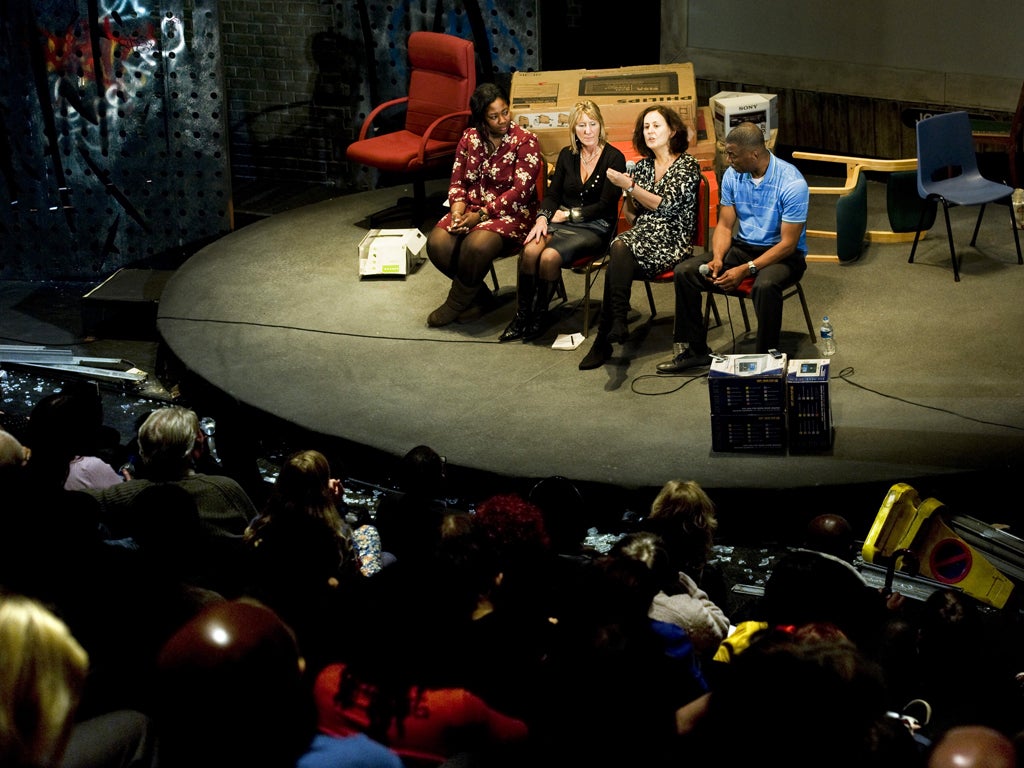A riots drama that goes back to the scene of the crime
Tottenham is staging a play about last year's disturbances. John Nathan attended

Your support helps us to tell the story
From reproductive rights to climate change to Big Tech, The Independent is on the ground when the story is developing. Whether it's investigating the financials of Elon Musk's pro-Trump PAC or producing our latest documentary, 'The A Word', which shines a light on the American women fighting for reproductive rights, we know how important it is to parse out the facts from the messaging.
At such a critical moment in US history, we need reporters on the ground. Your donation allows us to keep sending journalists to speak to both sides of the story.
The Independent is trusted by Americans across the entire political spectrum. And unlike many other quality news outlets, we choose not to lock Americans out of our reporting and analysis with paywalls. We believe quality journalism should be available to everyone, paid for by those who can afford it.
Your support makes all the difference.If the people can't – or won't – go to the theatre, some theatres are taking their shows to the people, in the case of the Tricycle's latest verbatim play, The Riots, to Tottenham, where last year's riots began.
Here, in stark contrast to the largely middle-class audiences at the Tricycle's Kilburn venue, the audience at Tottenham's Bernie Grant Arts Centre (BGAC) is the very community the play depicts.
Under artistic director Nicolas Kent, the Tricycle has a record of performing to specialist audiences. In 2010, Kent and his company travelled to Washington where they performed their Afghanistan cycle to a hugely appreciative audience consisting entirely of US military.
"You can see that there's a higher quality of listening," says Kent as he watches about 260 people of all ages and most races fill the BGAC auditorium. Many in the room have recent, raw memories of 6 August, the day that sparked the most fearsome crime wave in living memory. The talk among the art centre staff is of a woman who walked into the building where photographs of the riots have been installed. One illustrates police silhouetted against burning buildings. The woman burst into tears and attempted to take it down, objecting that the picture misleadingly suggested the police had attempted to protect the area from arsonists. One of the shocking facts confirmed by The Riots is that for long periods they watched it burn.
"I would have preferred to see more black people" says Kent discreetly. "But there should be more black people as the run continues," he predicts.
Among those taking their seats are friends and relatives of Mark Duggan, the man whose death by police bullet became the catalyst for the riots.
After the play, there followed a Q&A session with local community activists and the play's author Gillian Slovo. It was here that it become clear that The Riots gives voice to a community that feels disenfranchised. Tottenham MP David Lammy, who was not present, came in for a lot of stick. Stafford Scott, a community activist who is represented in the play, described Lammy's book on the riots Out of the Ashes as "the most abysmal piece of opportunism", which drew lots of applause.
Another audience member said he lived just a couple of streets from the huge Allied Carpets fire – the biggest fire on the High Road. He had seen the student protests in Central London and he was shocked at the difference in policing. He said: "The most painful thing is living in the community, watching your own community being trashed, and watching officers protect the local police station while allowing the community to burn down"
Playing to specialist audiences can be highly charged, agrees actor Tim Woodward who in The Riots plays Iain Duncan Smith and Chief Inspector Graham Dean who was the on-call officer in Tottenham on 6 August. Woodward also played a policeman in Kent's best-known verbatim play, The Colour of Justice – perhaps better known as the Stephen Lawrence play.
Though it opened at the Tricycle in 1999, Woodward still has vivid memories of performing in front of a mainly black audience during the transfer to the Theatre Royal Stratford East. As with all verbatim plays it was the actors' job to convey the exact words of real people.
"I was playing the assistant commissioner," says Woodward. "Unfortunately, he referred to black people as 'coloured'. Some people in the audience started barracking and at one point I had to stop acting and say, 'Look, I agree with you. But this is what he said, so I have to be truthful to that.' It was slightly intimidating. This time, I'm also playing authority figures, so I don't suppose I'll be terribly popular again."
'The Riots', Bernie Grant Arts Centre, London N15 (020 8365 5450) to 14 January
Join our commenting forum
Join thought-provoking conversations, follow other Independent readers and see their replies
Comments